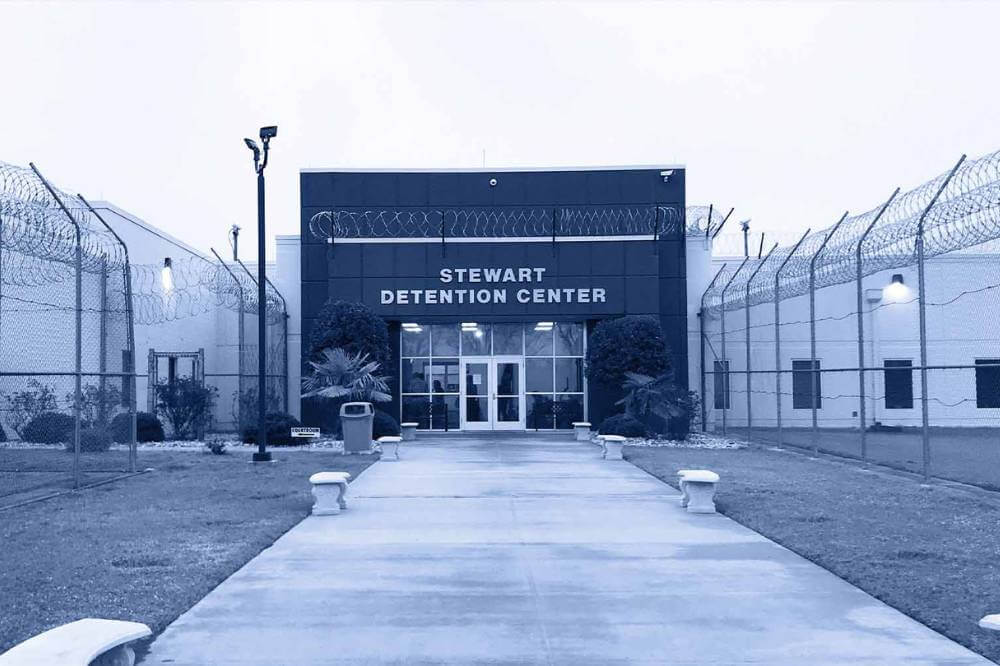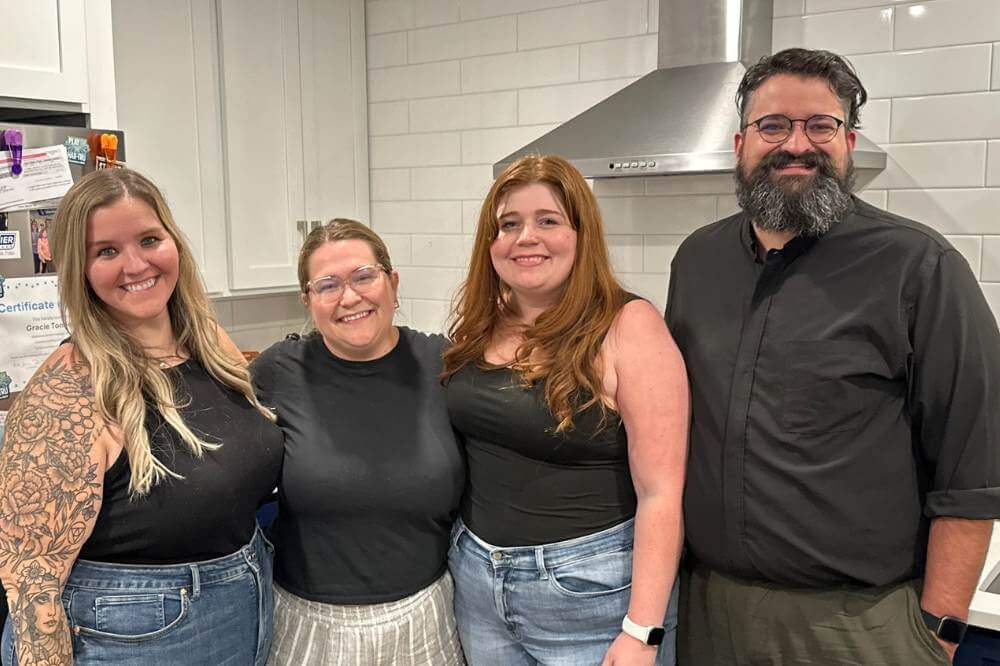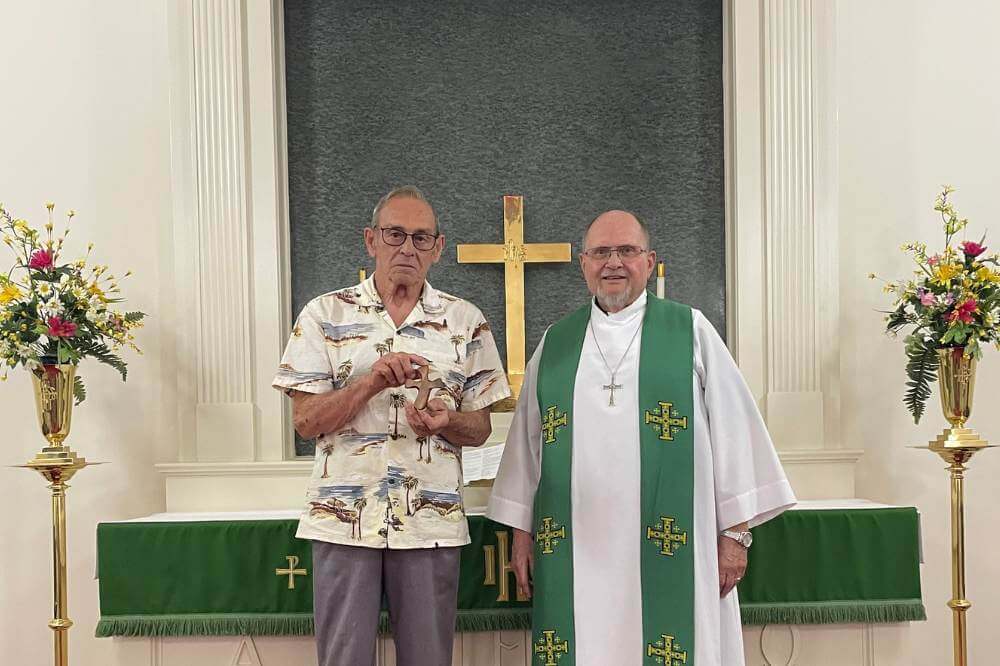Stewart Detention Center in Lumpkin, Georgia. (Credit Reuters)
I think the biggest tragedy of Holy Week might not be the torture and execution after all. Jesus is humiliated, he is paraded through a total farce of a legal process—he sees his own body taken away from him—and yet I doubt that was the worst of it. I imagine the worst part was that he was alone.
Peter denied him, sure, but at the very least he could have stayed nearby. The disciples came back out of hiding after the crucifixion (starting with Mary Magdalene), but who is there while Jesus dies? Who is there while he sobs from the cross with only Greek-speaking centurions around to idly guess at his last words? (Mrk 15:33-37)

Loneliness is its own torture, and unlike crucifixion, this is not one we’re done with yet. This past January, I had the opportunity to visit an immigration detention center in Lumpkin, Georgia. I traveled with a couple of members of First, Greensboro, and in partnership with Faith Action International, on a trip to visit, support, and learn about an organization known as El Refugio.
Stewart Detention Center is in the middle of a South Georgia wilderness. Detainees are allowed visitors, though few can make the trip. For the few brave families that make it—who travel hours and hours just for a chance to see their loved ones—El Refugio provides a safe, warm place to land. Free lodging, toys to keep their kids happy, and a smiling face to welcome them in out of the dark.
Then there are the many, many detainees who don’t get visitors. And El Refugio visits them, too.
It was early afternoon on the second day, and I was sitting in the visitation room in the privately owned detention facility. I was speaking with a young woman who had been detained for several months already. A long-distance friend had called El Refugio to request we see her.
We sat in hard plastic chairs, holding our phones and watching each other through a glass partition. We were strangers. I had nothing to offer her except a friendly face. We shared bits of our stories, and I listened to whatever she wanted to share.
Often all we can do through El Refugio is let people know that they are not alone—because there are few things worse than being truly alone.
Stewart Detention Center frequently uses solitary confinement as a punishment. The detainee I spoke with had yet to experience it in her two months of detention, but she visibly lived in fear of it. When you are far from home, thousands of miles from anyone you feel safe with; when you have no control of your movement, your time, your diet; when you don’t even have the dignity of privacy, one more level of isolation is an unimaginable terror.
Perhaps you were picked up in South Texas, and since then your life has just been a series of buses. Where are you? Maybe you’re lucky enough to speak some English and you get the word “Georgia” out of a guard, but does that mean anything to you? It’s winter; you’ve barely been outside in the last two weeks and you haven’t seen the sun in a month. Where are you?
And then there’s the waiting. How long did Jesus have to wait on the cross? When he screamed out words in a language the guards didn’t understand, did he scream out from pain or impatience?
The young woman I spoke with had signed a deportation order a month and a half before and was anxiously waiting to be finally deported. She had no stable life or society to return to, but she was eager—desperate—to be anywhere other than in this prison. But she had nothing; no travel plan, no plane ticket, no range of dates.
I can’t really know what that’s like, and I can’t really understand why she fled home. I truly can’t imagine what it would take to drive me to sell everything I own, run away from everyone I love, and flee for another country. That’s a human experience beyond anything I know.
But loneliness? What could be more universal? What could be more heartbreaking?
We came away from this visit without any easy lessons. We have no quick fixes or solutions: for this young woman, for this country, or for any of us. But that’s not why we went.
We went because we are the church. As the church, we sit with the lonely. As the church, we are the lonely. As the church, we are about witnessing Christ’s life, death, and resurrection—beginning to end, and then back to the beginning.
We are about the work of welcome, about doing what we can however we can to help people feel at home—to give them a sense that they are not alone. The work of welcome is the call of the gospel, for the sake of our neighbor in the pew or across the street, for the sake of the refugee, the traveler, the immigrant, and for the sake of Christ.
It is Christ who leads us into lonely places bearing news of hope, it is Christ who hangs before us, suffering and alone, and it is Christ who walks through our barred doors crying “Peace,” working his way into our lonely lives. (John 20:19)
My friend, this is not over and I can’t tell you when the pain will end. But I can tell you that Christ is risen, and we are not alone.
Hebrews 13:3
Remember those in prison as if you were together with them in prison, and those who are mistreated as if you yourselves were suffering.
Mark 13:33-37
33 At noon, darkness came over the whole land until three in the afternoon. 34 And at three in the afternoon Jesus cried out in a loud voice, “Eloi, Eloi, lema sabachthani?” (which means “My God, my God, why have you forsaken me?”).
35 When some of those standing near heard this, they said, “Listen, he’s calling Elijah.”
36 Someone ran, filled a sponge with wine vinegar, put it on a staff, and offered it to Jesus to drink. “Now leave him alone. Let’s see if Elijah comes to take him down,” he said.
37 With a loud cry, Jesus breathed his last.
John 20:19
19 On the evening of that first day of the week, when the disciples were together, with the doors locked for fear of the Jewish leaders, Jesus came and stood among them and said, “Peace be with you!”
Story Attribution:
Pastor Michael Dickson (First, Greensboro and NC Synod Coordinator for Social Justice and Advocacy Ministries)



